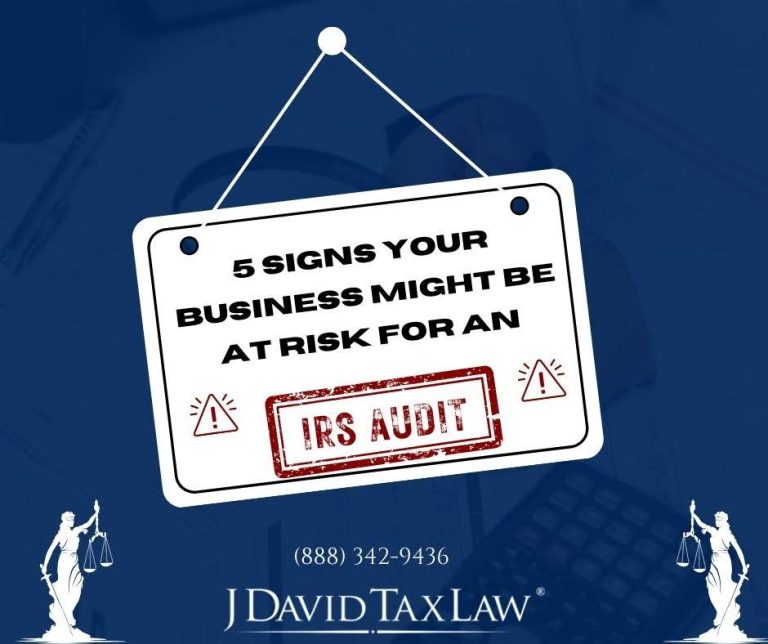
Yes, a tax attorney can negotiate with the IRS on your behalf,reducing penalties and resolving tax debt.Call our IRS tax relief attorney at (888) 342-9436.





In the complex landscape of tax compliance, business owners face the ever-present risk of IRS audits. With audit rates on the rise and a shift in focus by the IRS since the pandemic, it is important for businesses to stay vigilant.
This article outlines five key signs that may put a business at higher risk for an audit. By understanding these indicators, business owners can take proactive steps to ensure their tax records are accurate and compliant, potentially saving themselves from the disruptive and costly process of an IRS audit.
J. David Tax Law is equipped with seasoned tax attorneys who specialize in helping businesses navigate the complexities of tax audits. With their expertise, businesses can feel confident in their compliance and prepared to address any IRS inquiries effectively.
An IRS audit is a review of a business’s financial records and tax returns to ensure accuracy and compliance with tax laws. The IRS conducts audits to verify that the reported income, deductions, and credits are correct, which helps maintain the integrity of the tax system. This process ensures that all businesses are meeting their tax obligations.
The audit process typically begins with the IRS notifying the business by mail. The notice will detail the areas of the return under review and request additional documentation, such as tax records and receipts. Audits can be conducted through correspondence audits, where the IRS requests information by mail, or field audits, where an IRS agent visits the business premises.
Understanding what triggers an IRS audit can help businesses take proactive measures to avoid one. By recognizing common audit risks, business owners can better prepare and maintain compliance.
One of the most common triggers for an IRS audit is when reported business income does not match bank records. These discrepancies can arise from various issues, such as unreported income or errors in recording cash transactions. Businesses that handle a lot of cash must keep accurate records to avoid discrepancies. Accurate records help ensure that all income is properly reported, reducing the risk of IRS tax audit.
The classification of workers also affects audit risk. Misclassifying regular employees as independent contractors can lead to significant tax issues. This misclassification can result in discrepancies in payroll records and tax forms. Maintaining detailed records for all workers, whether independent contractors or regular employees, is crucial. This practice helps avoid discrepancies and supports accurate income reporting on tax returns.
How far back can the IRS audit you? Get the answer in less than a minute by filling out this quick contact form!
The IRS pays close attention to businesses that claim high deductions relative to their income, as this can increase the likelihood of being audited by the IRS. This examination often focuses on charitable deductions, business expenses, and home office deductions. When deductions appear excessive, it can signal to the IRS that a business might be inflating its claims to reduce taxable income. This is a common audit trigger that businesses should avoid.
Maintaining detailed records and proper documentation for all deductions is essential. This includes keeping receipts for business vehicle expenses, office expenses, and other deductible costs. High-risk deductions such as those for entertainment, travel, and medical expenses often draw extra scrutiny. Businesses must document these expenses thoroughly to prove they are legitimate business costs and comply with tax regulations.
Not separating personal expenses from business expenses can significantly increase IRS tax audit risk. When business owners use the same credit card or bank account for both personal and business transactions, it becomes difficult to prove which expenses are legitimate business costs. This lack of clear separation can raise red flags during tax audits.
Maintaining separate credit card and bank accounts for business operations is crucial. This practice simplifies tracking business expenses and helps avoid the pitfalls of mixed personal expenses. Aggressive claims that personal expenses are business deductions can lead to serious consequences. The IRS inspects these claims closely, and without proper documentation, businesses may face penalties for ineligible deductions.
Using complex or controversial tax credits can increase a business’s audit risk. Credits like the Employee Retention Credit, Child Tax Credit, and credits for recovery startup businesses offer significant tax benefits but come with detailed eligibility requirements. Common mistakes in applying for these credits include misinterpreting eligibility criteria or failing to provide adequate documentation.
The IRS closely inspects claims for these credits, especially those introduced during the pandemic. These pandemic-era credits, due to their complexity, require businesses to maintain thorough records and detailed documentation. Errors or aggressive claims can trigger audits, so it’s essential to approach these credits with caution and precision.
Does getting an EIN trigger an IRS audit? No, obtaining an EIN alone won’t lead to an audit. To clear up misconceptions like these, take advantage of our free consultation on IRS audits today!
Handling a large volume of cash transactions can draw significant IRS scrutiny. Cash transactions are harder to track and easier to underreport, making detailed documentation essential. Businesses must maintain thorough records, including receipts and mileage logs, to account for all cash dealings. This practice helps verify income and expenses during tax audits.
International dealings also pose audit risks. Businesses with foreign bank accounts or international transactions must comply with strict reporting requirements for foreign assets and accounts. Failure to report these accurately can lead to severe penalties and increased audit risk. Proper documentation and adherence to reporting rules are crucial for businesses engaged in international operations. For detailed information on tax audits visit https://www.jdavidtaxlaw.com/tax-audits/.
Maintaining detailed and accurate tax records is important for minimizing audit risks. Proper documentation helps verify income and expenses, making it easier to address any IRS inquiries. Consulting with a tax professional, like those at J. David Tax Law, can provide IRS audit help and support to ensure compliance with tax regulations and handle potential audit triggers effectively.
Business owners should regularly review their tax practices and consult with experts to stay informed about tax laws and requirements. Taking these proactive steps can help safeguard businesses from the disruptions and costs associated with IRS audits.
Our tax relief attorneys specialize in tax problems and tax debt resolutions
Get started with a 100% free consultation

Yes, a tax attorney can negotiate with the IRS on your behalf,reducing penalties and resolving tax debt.Call our IRS tax relief attorney at (888) 342-9436.

Missed the April 15 Tax Day 2025 deadline? Learn about IRS penalties, late payment relief, and how to settle your tax debt. Call us at (888) 342-9436.

IRS grants a tax deadline extension to California wildfire victims.Can you delay filing and payment until Oct. 15, 2025?Call at (888) 342-9436 to find out.
Get IRS Tax Assistance Within 24 Hours